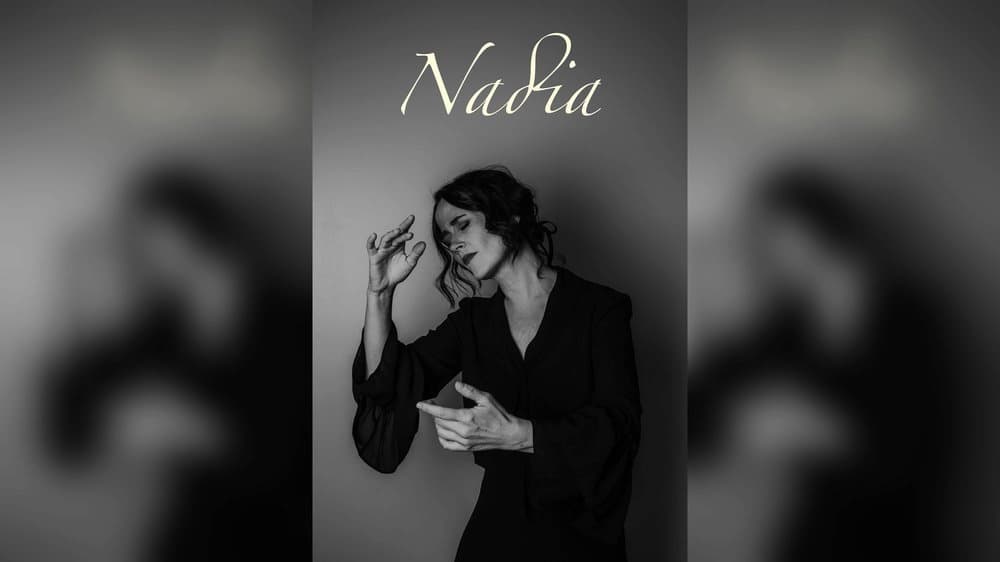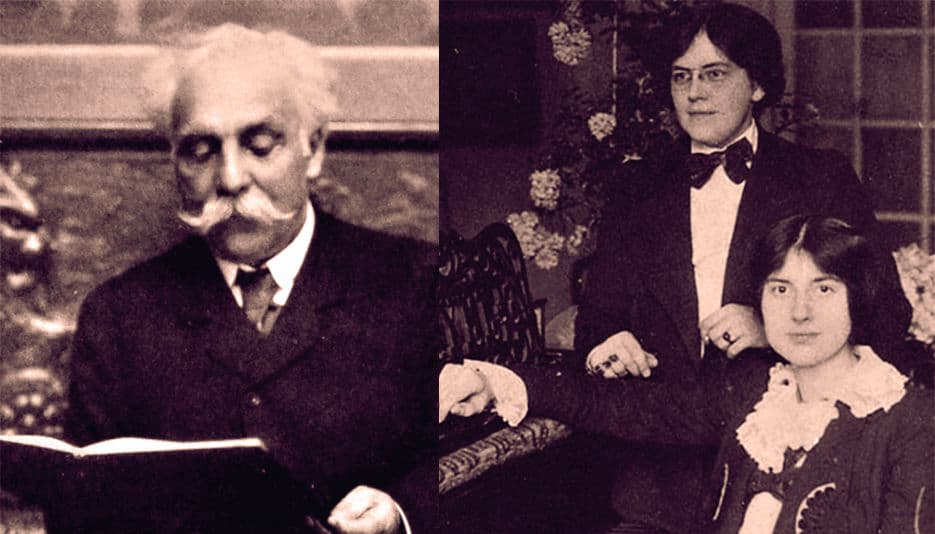In a mesmerizing upcoming performance of Nadia in Paris, actress, mezzo-soprano Adriana Zabala will embody the legendary and charismatic teacher, Nadia Boulanger. Nadia, a theater work, combines chamber music and storytelling, during which Nadia’s memories are unlocked by the music and musicians she inspired. In the play, Nadia shares her reactions to the death of her father and sister Lili (“the true genius of the family”) and follows her extraordinary path to the “crazy pleasure” of teaching.

Nadia Boulanger, composer, conductor, organist, and teacher, influenced a huge array of composers, soloists, and performers. Her affectionately known “Boulangerie” included, among others, Daniel Barenboim, Elliott Carter, Philip Glass, Roy Harris, Dinu Lipatti, Virgil Thompson, as well as composers Quincy Jones, Aaron Copland, and Astor Piazzolla.
Nadia Boulanger: 3 Pieces for Cello and Piano (Nicolas Altstaedt, cello; José Gallardo, piano)
Mina Fisher, cellist and creator of Nadia, and I met over coffee to chat about her upcoming performance of Nadia in Paris on March 10 at The American Church of Paris.
The daughter of music teachers, Mina studied with Janos Starker, and Fritz Magg at Indiana University, and in Vienna, with the French virtuoso André Navarra. She began her career as principal of the National Symphony of Costa Rica, where she learned Spanish while teaching several students. Soon after, she became Associate Principal of the New Orleans Philharmonic and then a member of the cello section of the Minnesota Orchestra, where she remained for 31 years. As the cellist of Ensemble Capriccio, she won the McKnight Award for Performing Artists, commissioned over a dozen pieces for string trio, toured internationally, and recorded four CDs. She joined the Bakken Trio in 2003 as their cellist and became Producing Artistic Director. The Bakken Ensemble commissioned and debuted Ms. Fisher’s play Nadia.

The American Church of Paris
JH: Mina, can you share a bit about your fascination with Nadia?
MF: When I had to retire in 2012, after three decades with the Minnesota Orchestra, I put all my energies into my own cello studio. While researching the practices of the best cello teachers, I became fascinated with Nadia’s remarkable career as a teacher and as a trailblazer for women in music. I wanted to understand why countless outstanding musicians of the Twentieth Century were drawn to her and how she was able to forge an incredible career during a time when it was very difficult for women artists. The timing was perfect as I was about to launch some of my own students into music schools. I discovered insightful videos and interviews with composers such as Piazzolla, Copland, and Bernstein, who’d studied with her. There are numerous and memorable quotes attributed to Nadia that were helpful in my own teaching. I really identified with the passion in her statement (about teaching) “Without joy…zero!”
JH: I personally love the quote, “Do not take up music unless you would rather die than not do so!” implying the unrelenting dedication that is needed to become a musician. Boulanger taught for most of her life in France out of her living room studio. It was the mecca for the musicians of the day. When did creating a play about her teaching become your vision?
MF: My first thought was to present a program of her music and show these videos. But even Nadia didn’t think her compositions were good enough. She frequently said that it was her sister Lili who was the talented one. I then imagined having an actress improvise vignettes to personify Nadia’s teaching, combined with the music of some of her protégés. But I encountered very costly fees and then complications with my actress’ schedule, so I decided to go ahead and write a play for my trio.
Lili Boulanger: D’un matin de printemps (Olivier Charlier, violin; Emile Naoumoff, piano)

Gabriel Fauré and the Boulanger sisters © Bru Zane, Centre de Musique romantique Française
JH: What stood out about her teaching, would you say?
MF: Her attention to detail was uncanny. She instilled the importance of seeking intention at every moment of musicmaking. Her profound knowledge of music enabled her students to add a depth which was unfathomable before. No wonder they called her the Oracle!
I love the story conductor Stanislaw Skrowaczewski shared with me. He told me that after he emigrated from Poland, he went directly to Nadia’s studio. “Come in,” she said. “What do you have for me?” He handed her a score and for 40 long minutes Nadia studied the music without saying a word! Then abruptly she remarked, “Here, page 20. That doesn’t belong. Take that out. But here, on page 15. Write more like that. That’s it. That’s you.”
The great Argentinian composer Astor Piazzolla had a similar experience. Initially he was embarrassed to bring a tango composition to the great lady, a master teacher of classical music. But she vehemently insisted that the tango was his authentic voice and that writing tangos was what he should do.
JH: I was in the audience for the debut of Nadia in 2017. I recall the musical selections were quite delightful, including music by Nadia’s sister Lili, Nadia’s students Piazzolla and Quincy Jones, and French composer Fauré, whose works she championed. Where has your play gone since?
Astor Piazzolla: Triunfal (arr. V. Villadangos) (Sebastian Caldas, guitar)
Quincy Jones: Soul Bossa Nova (arr. A. Siranossian and N. Gouin for cello and piano) (Astrig Siranossian, cello; Nathanaël Gouin, piano)
MF: After the sold-out performances in Minneapolis, the play was performed at St. Olaf and Luther Colleges. We later toured Nadia in northern Minnesota courtesy of a Minnesota State Arts Board grant. The fabulous mezzo-soprano Adriana Zabala, who will be appearing in France, stepped into the role in 2020 for additional performances in Minnesota, Pennsylvania, and Wisconsin.
Nadia trailer:
JH: And how did the Paris opportunity come about?
MF: A friend who lives in Paris urged me to contact the Atelier Chamber Music Series, held in the American Church of the Holy Trinity in Paris—an imposing Gothic cathedral on the Seine. Adriana Zabala’s French sister-in-law is a violin professor at the Paris Conservatoire who gladly endorsed the project. She will be playing the role of The Violinist part in the play.
JH: What were some of the challenges you encountered in writing Nadia?
MF: I think writing a play is like programming a concert. It’s important to entice the audience by depicting a story arc. If one varies the intensity of each moment, the audience is more likely to bond emotionally with the story. It was important for me to show how Nadia engaged her students, how she urged them to find their best voices and to showcase her vivid personality!
JH: I understand there are some surprises and mysteries surrounding Nadia.
MF: Her stature as a musician came despite the odds against her. In her generation, women were not free to “do their own thing.” She was paid half of the teaching salary her male counterparts were paid. Despite that, she was the first woman to conduct the Royal Philharmonic Society, Boston Symphony, and Philadelphia Orchestra, she toured extensively, and she appeared as a sought-after guest lecturer.
But she became distrustful of journalists, likely due to the nasty barbs she received early on from the press, so her personal story is largely unknown except for the definitive biography by Léonie Rosenthiel written late in Nadia’s life. The Centre Boulanger in France still believes that there are many “missing documents” that could illuminate her life for us today. But the most important thing to note is that Nadia’s teaching has resonated into today. She truly changed music.
The American conductor Walter Damrosch wrote about Nadia, “Among women, I have never met her equal in musicianship, and indeed, there are very few men who can compare with her. She is one of the finest organists of France, an excellent pianist, and the best reader of orchestral scores that I have ever known.” (from his 1923 memoir My Musical Life)
JH: Thanks, Mina, for bringing Nadia to life. I hope our French readers will note the date and information below.
Sunday, March 10 at 5:30 pm (17:30h)
Atelier Nouveau Series,
The American Church in Paris,
65 Quai d’Orsay
Artists:
Adriana Zabala, (Nadia) Mezzo/Actress, Yale Professor of Voice
Stéphanie Moraly, (The Violinist) Professor at the Paris Conservatoire
Eric Fung, (The Pianist) Professor at Lebanon Valley College
Caroline Paulsen, (The Cellist) Köln Hochschule
Program Includes:
Nadia Boulanger – Chansons
Lili Boulanger – D’un Jardin de Printemps
J.S. Bach– Erbarme Dich
Gabriel Fauré- Après un Rêve
Quincy Jones – Everything Must Change
Astor Piazzolla – Triunfal
Find out more about the American Church series.
For more of the best in classical music, sign up for our E-Newsletter

